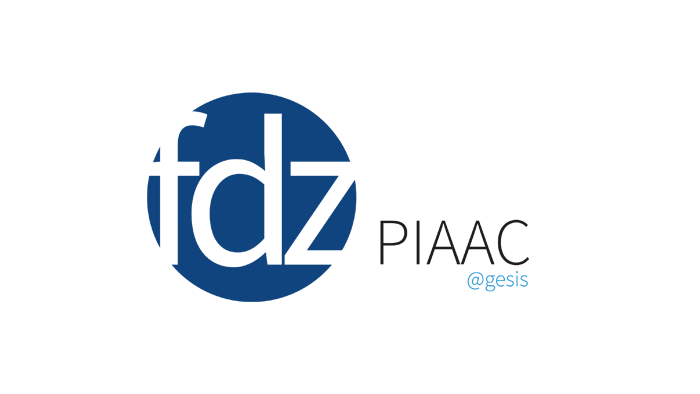Research Data Center PIAAC at GESIS

The Research Data Center PIAAC makes research data accessible to the scientific community and offers advice to the users. The RDC PIAAC provides German and international datasets in the educational field focusing on the adult population, especially on the Programme for the International Assessment of Adult Competencies (PIAAC).
- Thematic Focus: Work, Occupation & Labor Market, Education
- Data type focus: Quantitative
- Status: Accredited
- External Data Ingest: Yes
- Network affiliation: Verbund Forschungsdaten Bildung
- RDM Consultation: No
Data Offer
PIAAC – Programme for the International Assessment of Adult Competencies
- National Scientific Use File of the German PIAAC Main Study: Cross-sectional data from the PIAAC Main Study in 2011/2012 (Cycle 1) focusing on the assessment of cognitive skills (literacy, numeracy, and problem solving in technology-rich environments). The sample (N=5,465) comprises the working-age population in Germany (16 to 65 years).
- National PIAAC Supplement Studies: (1) Prime-Age and (2) Competencies in Later Life (CiLL). The Prime Age Study (N=4,000) investigates the relationship between skills and labor market prospects of low-skilled workers in Germany. The CiLL study focuses on the competencies of 66- to 80-year-old adults in Germany (N=1,392).
- PIAAC Longitudinal Study: Panel data which follows up the German PIAAC sample with three additional waves of data collection (in 2014, 2015, and 2016), each with a somewhat different focus (N=6,231; 4,631; 4,881). The PIAAC-L questionnaires are based on instruments from PIAAC 2012, core instruments from the German Socio-Economic Panel (SOEP), and the National Educational Panel Study (NEPS).
- PIAAC Log Files: Paradata from the PIAAC Study in 2011/2012. The data includes the logged user interactions during the skills measurement. The log files from 17 countries are available and contain paradata for each participant from one or two competency domains.
PIAAC Pilot Studies on Non-Cognitive Skills
- PIAAC, English Pilot Study on Non-Cognitive Skills: Data from a cross-sectional survey in 2016. Target subjects were 16–65-year-old adults (N=5,910) in the US and UK. The data deals with the validation of personality scales (e.g.: Big Five, traditionalism, self-efficacy).
- PIAAC, International Pilot Study on Non-Cognitive Skills: Data from cross-sectional survey in 2016. Data from a cross-sectional survey in 2017. Target subjects were 16- to 65-year-old adults (N=6,924) in five countries. The data deals with the validation of personality scales (e.g.: Big Five, traditionalism, self-efficacy).
IALS – International Adult Literacy Survey
- International Adult Literacy Survey (IALS), Germany. Data from a cross-sectional survey in 1994. The target persons were randomly selected adults between the age of 16 and 65 (N= 2,062). The study assessed cognitive skills (literacy) in Germany and further countries.
LEO studies: Living with Low Literacy
- Level-One Studie (Level One): Data from a cross-sectional survey in 2010. The study accessed the extent of low literacy (functional illiteracy) among German-speaking adults between the ages of 18 and 64 (N= 8,436).
- LEO 2018 – Living with low literacy: Data from a cross-sectional survey in 2018. The study (N=7,192) is based on a population-representative, Germany-wide assessment of the reading and writing skills of adults (18- to 64-year-olds).
AES – Adult Education Survey
- The AES survey covers participation in education and training (formal, non-formal and informal learning) of adult population. Further education and training behavior in Germany has been recorded since 1979 as part of the Reporting System of Further Education (Berichtssystem Weiterbildung_BSW VIII). Since 2007, this survey has been aligned with the framework of Adult Education Survey (AES) by Eurostat and is therefore comparable with other European countries. AES is carried out in for Germany in a 2-year cycle, beginning in 2007. Target population is the German resident population aged 18 to 69.
Services
- Data preparation & documentation
- Data access & user support
- Knowledge transfer & networking
Data Access Mode
- Public Use Files
- Scientific Use Files
- On-site access at the Secure Data Center
Contact
PD Dr. Débora B. Maehler
Research Data Center PIAAC (RDC PIAAC)
GESIS – Leibniz-Institute for the Social Sciences
Postfach 12 21 55
68072 Mannheim
Email: fdz-piaac@gesis.org